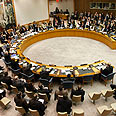
The day after Palestine
Op-Ed: UN recognition of Palestinian state a flawed international effort to shirk responsibility
In three weeks, a sovereign Palestinian state will almost certainly be welcomed into the United Nations – if not by the UN Security Council then as a “non-member state” by the General Assembly. Worldwide celebrations in honor of the new Palestinian state will undoubtedly take place. Unfortunately, this festival will be honoring a superficial development; an illusion of achievement. In reality, recognition of a Palestinian state in the current political climate will not resolve any of the outstanding issues of the Israeli-Palestinian conflict, only exacerbate them.
Here is an ominous reminder: the UN will be recognizing a state whose government(s) maintains questionable legitimacy among its own population, is maligned by deep corruption and internal fighting, lacks control over terror cells that undermine all peace efforts, is depressingly mismanaged and is completely dependent on Israeli industry. The world will be voting int o existence a welfare state that currently owes much of its sustenance to the donations of the international community and Israeli tax transfers.
The Fatah-Hamas reconciliation agreement has proven to be a failure and never came close to being implemented – and it may never be. Abbas recently rejected the recognition of Israel as the Jewish State. The recent terror attacks and rocket fire emanating from Gaza have shown that terrorist groups other than Hamas hold considerable political and military sway in the Gaza Strip. Israeli security cooperation with Fatah has minimized similar developments in the West Bank, although that certainly didn’t prevent the Itamar massacre or other recent murders. Are these positive signs that point to a nation ready for statehood?
Anyone who endeavors to predict the consequences of the Palestinian bid is imprudent, yet media commentators and politicians are shuffling through the foreseeable scenarios. Large-scale riots, peaceful protests, violent confrontations, and regional war - anything is possible. The Arab Spring’s results (or lack thereof) already showed us that the Middle East is volatile, erratic and largely unpredictable. Yet one thing is clear: The vote will do nothing to further the interests of Israelis or Palestinians, and can only serve as a critically divisive moment within an already less than stellar period of Israeli-Palestinian relations.
Although defining “statehood” by standards of international law can be problematic, the four main criteria are (a) permanent population, (b) defined borders, (c) effective government and (d) ability to maintain relations with other states. The PA fails to fulfill at least two, if not three, of these criteria.
Fictitious solution
The Palestinians deserve freedom, justice, security and self-determination. However, a Palestinian state should only be established through a comprehensive and viable peace agreement. We need negotiations that offer real solutions to the intractable issues that statehood is meant to alleviate. Contrarily, the current UN bid looks to shirk responsibility for resolving internal and external Israeli-Palestinian issues of significant magnitude, issues that must be resolved before statehood can be bestowed upon a population who, as of now, seems woefully unprepared for it.
Some observers argue that UN recognition will force Israel to finally realize its West Bank presence is unacceptable to the international community. Yet the real consequences of such recognition vary considerably depending on who you ask. Many analysts seem to agree that the current bid will likely have no practical implications. It is reasonable to assume that UN recognition will provoke confrontations between Palestinian nationalists, settlers and Israeli soldiers.
Of course, the threat of further international isolation and boycotts against Israel is also reasonable, but authentic progress won’t - and never has - come from unilateral action or power plays in this conflict, but through mutual agreements and meaningful negotiations.
Many nations around the world understandably want to wash their hands of the Israeli-Arab conflict and rid themselves of a problem that has been a source of immense political tension and violence for more than four decades. However, the current UN bid will not wash away the blood of thousands of Jewish and Palestinian lives that have been lost in this conflict, and the fictitious solution of declared statehood certainly won’t prevent further blood from being spilled. It may in fact encourage it.
The upcoming vote on a Palestinian state in September is an attempted quick fix, an example of the international community dodging responsibility in order to force progress on an intractable conflict. This approach will be a serious mistake. Fortunately for those countries, the implications of such recognition probably won’t result in violence, bombings, shootings or the loss of innocent life in their respective countries like it will here in our region.
Abbas, Erekat and others have claimed that the current UN bid is not meant to isolate Israel. However, unless the UN bid is retracted - which several senior leaders of the PA have recommended – both countries will be isolated: Israel from the international community and Palestine from realizing its true aspirations of sovereignty and self-determination.
The right of return, Jerusalem, recognized borders, freedom of movement, settlements, security and commerce issues will only be resolved through negotiations, not symbolic recognition or empty declarations. As long as both parties are guilty of refusing to return to the negotiating table, it will be to the detriment of all of us who desire to see a peaceful end to this conflict.
Avi Yesawich is an independent journalist and political commentator. He holds degrees from Cornell University and Tel Aviv University, is an IDF combat reservist and co-founder of Israeli Centrism, a social/political blog focusing primarily on Middle Eastern affairs.
- Follow Ynetnews on Facebook
- Receive Ynetnews updates directly to your desktop










